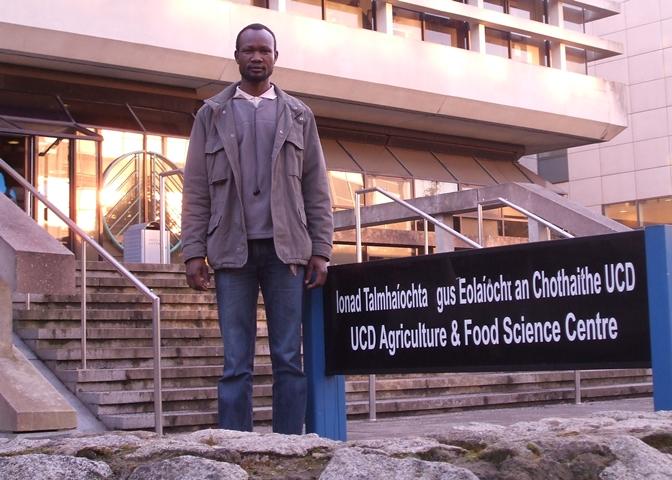Ben Koryang Baatom
(Uganda)
MSc (Agr) Sustainable Agriculture and Rural Development, University College Dublin
Ben Koryang Baatom received a 2010-11 fellowship from Irish Aid to study for a Masters in Sustainable Agriculture and Rural Development at University College Dublin. To do so, he took a time out-from heading a team of community development workers in Kaabong District Local Government, Uganda.

When you have a background at work and you come to do a class, especially a Masters, you interact with other students who’ve been to the same situation you’ve been to. Sharing the experiences from different countries blends knowledge and gives a lot of skills and ideas and you learn things that you were not able to do while at work.
I learnt about the fellowship way before I applied, back in 2005, explains Ben. But then I didn’t meet the experience required. I looked at it as a challenge and didn’t give up. I worked on with the District and applied in 2009 when I had more than five years in service. By then I had been very involved in field-work and engaging communities in development programmes.
Initially I was interested in doing a course related to rural development and in 2006 I looked at the universities in Ireland and saw the UCD Masters course. Last year when I was applying, the course had changed, with the introduction of the sustainable agriculture aspect. I saw it as an advantage.
I don’t come from an agricultural background so I knew the course would help me work better with communities and it has given me more skills than I expected. Agriculture is the major activity that people survive on in my district, which is more than 80% agriculture based. Now I’ll be able to go back and engage not only in the programmes I was doing but deep into agricultural activities. From the course, I’ve been able to get an in-depth analysis and discussion of the whole concept of sustainability, whether it’s sustainable development or sustainable agriculture. It’s a global issue but it has to be practised at small scale to combine into the bigger picture. Sustainability is a new concept with my communities. When I go back I’ll be an ambassador in this area, looking at agricultural productivity and conservation of the natural resources.
When I was working with communities I knew to go out to ask them what problems they had but I didn’t know the many other things that you must have at the back of your mind. Communities know problems, the problems they face themselves – it’s not enough to go and ask them and then tell them what to do, direct them or show them how it’s supposed to be done. It’s about going to listen, ask, learn from them and encourage them to look at the issues more deeply, helping them own the development process themselves. That’s what makes the success of the project viable and it’s a major thing I’ve got from this course.
The programme is not specific to a particular issue, it’s wide – you have strategic communication skills that allow you to work alongside and engage in conversation and discussion with communities. Identifying and analysing the needs of the people requires research methods skills which I’ve also had in this course.
I head a team of other community workers so what I have learnt here is a very big asset for me to mentor them through engaging with communities. I’m aiming to share the technical knowledge and experience I’ve gained here with the rest of my colleagues. It’s going to change my approach, too – not just being a team leader, one who encourages participation. I’ll be looking at increasing their input into the process of achieving the goals of the department. We must be working toward seeing change in the livelihoods of the community, not just outputs that can’t be seen.
When you have a background at work and you come to do a class, especially a Masters, you interact with other students who’ve been to the same situation you’ve been to. Sharing the experiences from different countries blends knowledge and gives a lot of skills and ideas and you learn things that you were not able to do while at work.
A big thank you goes to Irish Aid for my having got this opportunity as an individual. Coming to learn this course is a very big asset to me and there’s also a lot of investment involved in it to translate into the Irish Aid targets and objectives.
The things I’m learning on the course are not just for the purpose of having the knowledge, these are things that I must go and translate on the ground. It’s showing me what I have a responsibility to do.